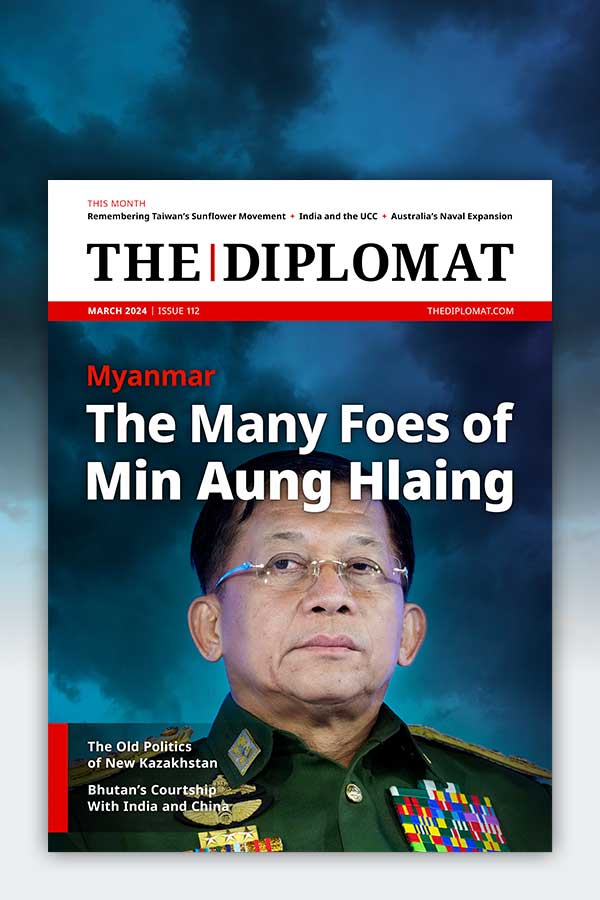| Welcome to the latest issue of Diplomat Brief. This week our top story explores what we know about the Chinese balloons overflying Taiwan. We also have an interview with S.D. Muni, a scholar of South Asian studies and professor emeritus at Jawaharlal Nehru University, on India’s diplomatic approach to its neighbors. |
| Story of the week | ![[object Object]](https://thediplomat.com/diplomat-brief/2024/vol11/images/feature.jpg?v=1) | Security Overinflated: China’s Balloon Threats to TaiwanWhat Happened: In 2023, as the United States watched a Chinese “spy balloon” drift over the U.S. mainland, Taiwanese defense officials revealed that they had tracked “dozens” of similar balloons flying over the island in recent years. In December, Taiwan began regularly tracking balloons from China, leading to a spate of media coverage and speculation that this marked a new front in China’s “gray-zone” coercion of Taiwan. But what we actually know about the balloons suggests the threat is overstated. Our Focus: Even when Taiwan’s Ministry of National Defense announced that it would be regularly publishing information on the balloons, that came with an important caveat: that the balloons are “from China, and not necessarily from the PLA.” In fact, a defense ministry spokesperson explicitly said that most of the balloons were weather balloons. Jonathan Walberg and Noah Reed, two student researchers at George Mason University, mapped “the balloon overflights over points of interest in Taiwan.” Their conclusion: “While some of the flights pass over landing beaches, radar sites, and ground bases, far more go over rural areas with no infrastructure, while many bypass the island completely.” What Comes Next: “It is far more likely that these are weather balloons instead of a strategy to overwhelm analysts with flights,” Walberg and Reed concluded. Given China’s extensive surveillance capabilities regarding Taiwan, it’s unlikely that these balloons, even if meant for military purposes, would add much value in terms of ISR. In the end, “despite the daily reports and alarmist news articles, it seems unlikely that what appear to be Chinese weather balloons will endanger Taiwanese national security to the point of requiring a significant response.” Read this story |
| Behind the News | INTERVIEW S.D. MuniS.D. Muni, a scholar of South Asian studies and professor emeritus at JNU, on India’s struggle to implement high-profile projects abroad: “[O]ne of the major problems with Indian foreign policy is its ‘delivery deficit.’ Projects are sometimes announced just to mark high-level political visits without proper planning and financial allocation. Many of the projects undertaken are not completed in time and to the satisfaction of the targeted receiving country.” Read the interview |
| This Week in Asia | Northeast Asia Hong Kong Looks to Pass National Security LegislationFollowing the near-eradication of political dissent in Hong Kong using the Beijing-enacted National Security Law, the special administrative region (SAR) is now looking to pass its own national security legislation, in line with Article 23 of the SAR’s Basic Law. A new bill introduced by the Hong Kong authorities would further expand the government’s ability to surveil civil society and punish vaguely-defined crimes of sedition and collusion with “external forces” – with extraterritorial applications. Despite criticisms, the bill could be passed as early as this week, given the lack of any opposition figures in the Hong Kong Legislative Council. Find out more | South Asia India Begins to Implement Citizenship Amendment ActWith general elections just weeks away, India’s government announced rules to implement the 2019 Citizenship Amendment Act, a controversial law that paved the way for religious minorities from Bangladesh, Afghanistan, and Pakistan to become citizens – but pointedly ruled out Muslims seeking safe haven (such as the beleaguered Rohingya community of Myanmar). The 2019 law sparked mass protests, as critics believed it could be used to strip Muslims of citizenship. Find out more | Southeast Asia Thailand’s Move Forward Standing on a Knife’s EdgeThis week, Thailand’s Election Commission requested that the Constitutional Court dissolve the opposition Move Forward Party (MFP), acting on a petition filed by an ultra-royalist activist last month. The MFP won a surprising victory at last year’s general election, on a radical platform that included pledges to break up business monopolies and end military conscription. But the party was blocked from forming a government by the military-appointed Senate and has since come under legal scrutiny for its campaign pledges to amend Article 112 of the Thai penal code, which criminalizes any criticism of the monarchy. In late January, the Constitutional Court ordered the MFP to cease advocating for a change to Article 112, prompting a conservative activist to file a petition demanding its dissolution. Find out more | Central Asia Alleged ISKP Plot Foiled in Russia, 2 Kazakh Citizens KilledRussian authorities reportedly foiled an Islamic State Khorasan Province (ISKP) plot last week. This week Kazakhstan confirmed that the two men killed were Kazakh citizens, once again highlighting Afghanistan-based ISKP's efforts to recruit Central Asians to carry out attacks abroad. Unlike other Islamic State offshoots, ISKP appears to be the most transnationally active, targeting Russia and also carrying out recent attacks in Turkey. Find out more |
| Visualizing APAC |  | Source: Ministry of Finance, ROC (Taiwan) Despite Tsai Ing-wen’s stated goal of reducing Taiwan’s economic dependence on China, the share of exports heading to the mainland and Hong Kong only started to come down after the pandemic. See the full picture |
| Word of the Week | Society पारलैङ्गिकParalaingik: The Nepali word for “transgender.” The term was carefully created by activists to replace the existing – but imprecise – term तेस्रो लिङ्गी (tesrolingi), which literally means “third gender.” Find out more |
|  |

![[object Object]](https://thediplomat.com/diplomat-brief/2024/vol11/images/feature.jpg?v=1)

